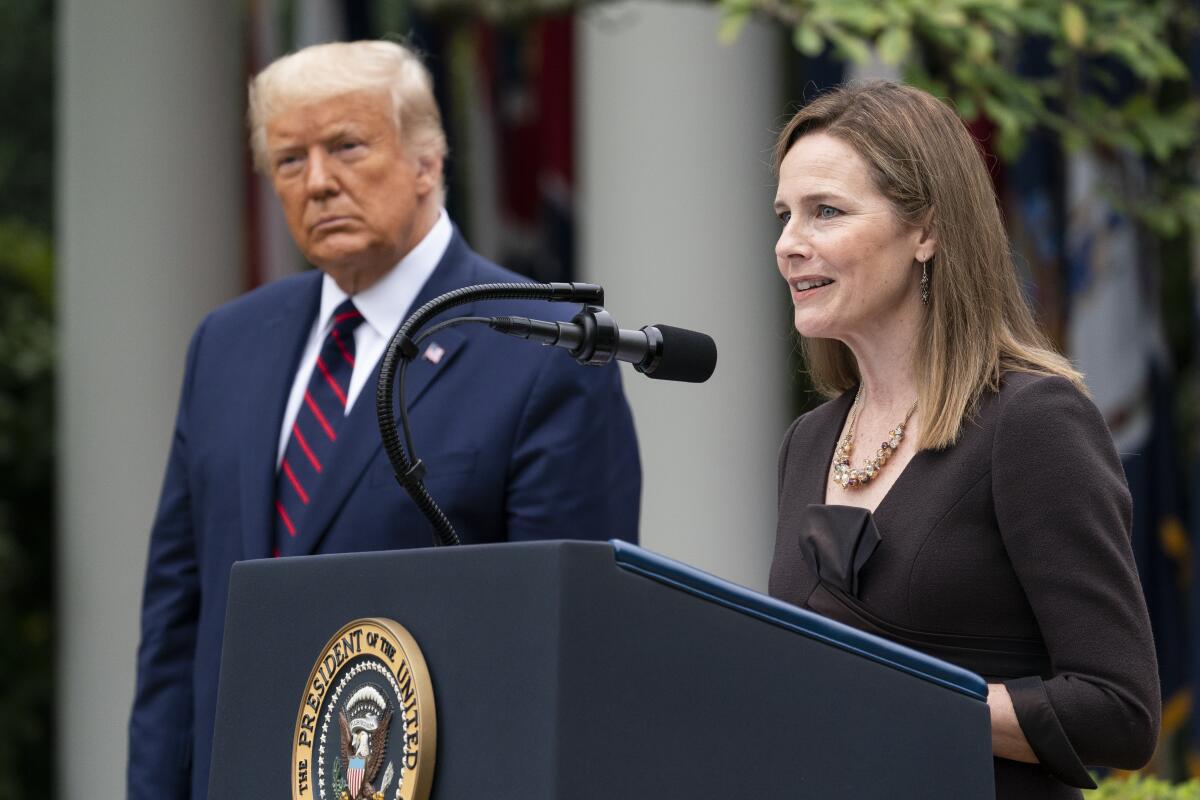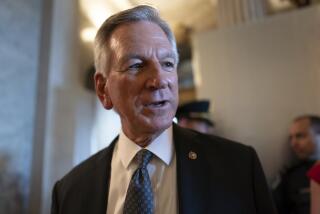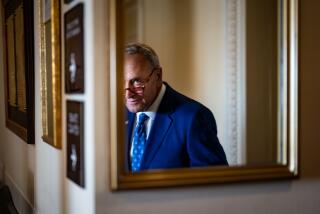White House virus outbreak could complicate Supreme Court confirmation

WASHINGTON — Senate Republicans pledged to plow ahead with the confirmation of Judge Amy Coney Barrett to the Supreme Court despite President Trump’s diagnosis of COVID-19 and the potential for an outbreak among their ranks.
Senate Majority Leader Mitch McConnell (R-Ky.) called the virus the “biggest enemy” standing in the way of confirming Barrett, given the close margin of votes he is working with.
With two Republicans already opposed to confirming a nominee so close to the November election, McConnell can afford to lose only one more vote on the Senate floor and still confirm Barrett. Because senators must be in the chamber to cast a vote, any absence of a Republican because of illness or necessary quarantine could put the vote tally at risk.
Republicans are “keeping everybody healthy and well and in place to do our jobs,” McConnell said on the Hugh Hewitt radio show. “Every precaution needs to be taken. We don’t anticipate any Democratic support at all ... and therefore everybody needs to be in an all-hands-on-deck mindset.”
Republicans view Barrett’s confirmation as a once-in-a-generation opportunity to pull the Supreme Court to the right, one that they are unlikely to allow anything to derail. But it was Barrett’s nomination that could have put lawmakers at risk.
Sens. Mike Lee (R-Utah) and Thom Tillis (R-N.C.), both members of the Senate Judiciary Committee, announced Friday that they had tested positive for the virus. They attended the Saturday announcement of Barrett’s nomination at the White House Rose Garden along with Trump, First Lady Melania Trump, the president of the University of Notre Dame, where Barrett used to teach, and White House aide Hope Hicks, all of whom have tested positive.
More than dozen other Senate Republicans attended the packed event. Like most of the crowd, many of the elected officials at the event did not wear a mask.
On Thursday, Lee attended a Judiciary Committee meeting, potentially exposing other members of the panel to the virus. Sen. Dianne Feinstein (D-Calif.), the top Democrat on the committee, was expected to get a test, an aide said Friday.
Amid the looming threat, Republicans on the committee are preparing for a pandemic-style, largely virtual confirmation hearing, which is scheduled to get underway Oct. 12.
“We’re on track,” Sen. Lindsey Graham (R-S.C.), the committee chairman, told reporters in South Carolina on Friday. “We’re in a good spot. She’s going to get confirmed.”
Senate committees have been meeting remotely, and members of the Judiciary panel are expected to be able to do so also. Barrett and Graham are expected to be in the committee room, and senators will have the option of questioning remotely, according to a committee aide.
Sanitizing stations will be at every senator’s desk. Seating for staff and press — who typically jam into the room for such high-profile hearings alongside the public — will be severely restricted, the aide said.
Democrats, who have argued against Trump filling the vacancy since Ruth Bader Ginsburg’s death last month, urged Republicans to slow down. Feinstein and Senate Minority Leader Charles E. Schumer (D-N.Y.) called it “premature” for Republicans to pursue a hearing in 10 days.
A virtual hearing is “not an acceptable substitute,” they said in a statement, pointing to the fact that all Circuit Court nominees heave appeared in person for their confirmation hearings during the pandemic.
“It’s critical that Chairman Graham put the health of senators, the nominee, and staff first — and ensure a full and fair hearing that is not rushed, not truncated, and not virtual. Otherwise this already illegitimate process will become a dangerous one,” they said.
Republicans have shown a sense of urgency in getting Barrett confirmed before the November election, when control of the Senate chamber will be up for grabs. This week, Barrett held introductory meetings with dozens of Senate Republicans. Barrett had the coronavirus this summer and has since recovered, a fact first reported by the Washington Post on Friday.
In addition to the political calculations, there is a serious health threat involved in continuing to conduct business in the Senate: The average age of a senator is nearly 63, meaning most senators are considered to be in a high-risk category.
Trump’s diagnosis — as well as Lee’s — amplified calls for more frequent or even mandatory testing in the Capitol.
McConnell said he would not cancel next week’s planned Senate session.
“So far, the disease has not kept us from operating as we would normally, and there’s no reason to expect that to be the case in the foreseeable future,” he said.
The threat of an outbreak has loomed over the Senate, like the rest of the world, since March. The vast majority of senators — all except Sen. Rand Paul (R-Ky.), a physician who had the virus and says he now has immunity — are frequently seen wearing masks while in the Capitol. Handfuls of House Republicans have been seen without them.
There was a threat of an outbreak in March, when Paul contracted the illness and was spotted in Senate facilities. However, no known major spread occurred among lawmakers.
Times staff writer Janet Hook in Myrtle Beach, S.C., contributed to this report.
More to Read
Get the L.A. Times Politics newsletter
Deeply reported insights into legislation, politics and policy from Sacramento, Washington and beyond. In your inbox three times per week.
You may occasionally receive promotional content from the Los Angeles Times.











